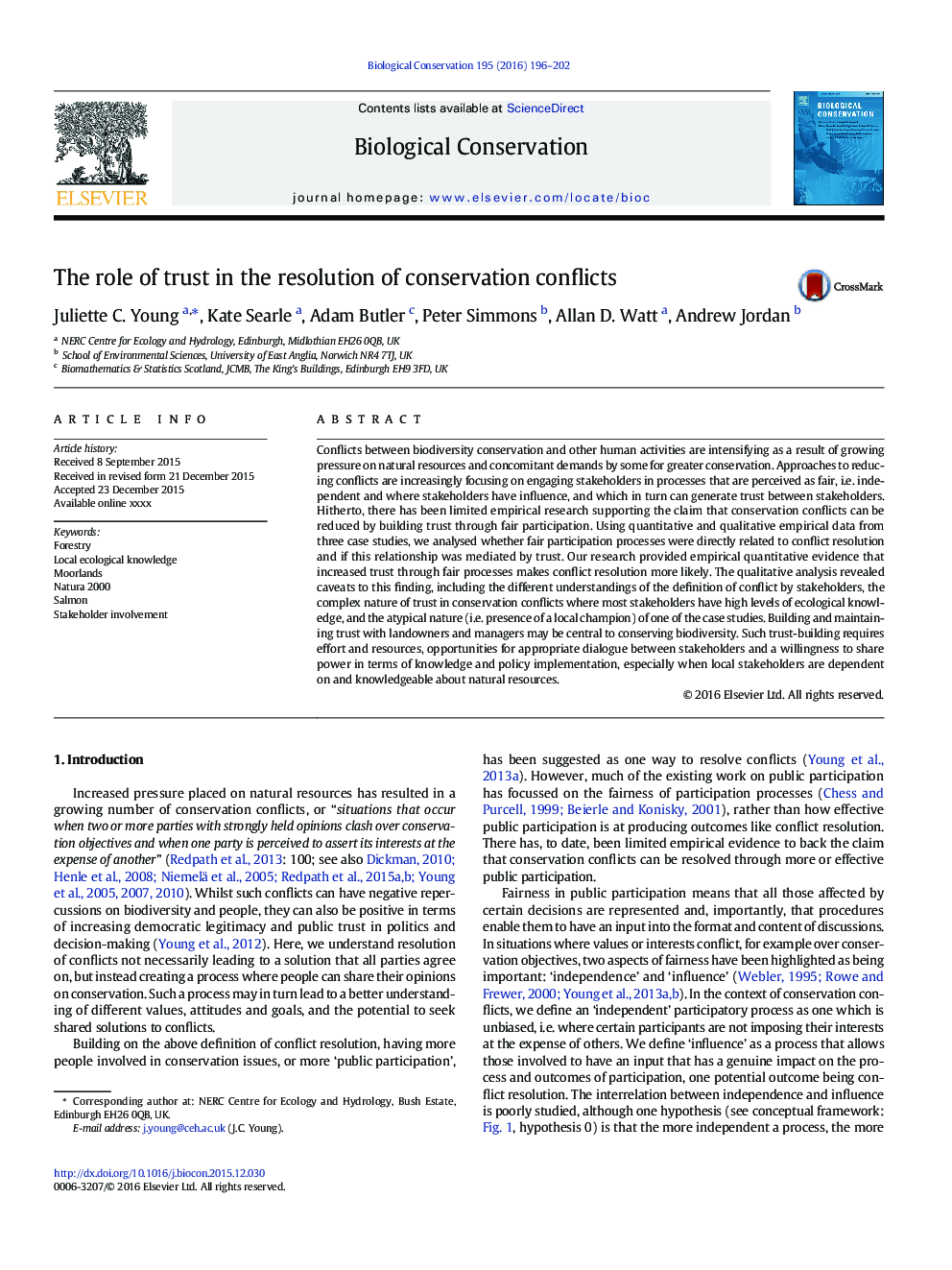| کد مقاله | کد نشریه | سال انتشار | مقاله انگلیسی | نسخه تمام متن |
|---|---|---|---|---|
| 6298718 | 1617906 | 2016 | 7 صفحه PDF | دانلود رایگان |
عنوان انگلیسی مقاله ISI
The role of trust in the resolution of conservation conflicts
ترجمه فارسی عنوان
نقش اعتماد در حل اختلافات حفاظتی
دانلود مقاله + سفارش ترجمه
دانلود مقاله ISI انگلیسی
رایگان برای ایرانیان
کلمات کلیدی
ترجمه چکیده
مناقشات میان حفاظت از تنوع زیستی و سایر فعالیت های انسانی در نتیجه افزایش فشار بر منابع طبیعی و تقاضای مشابه برای برخی از آنها برای حفاظت بیشتر تشدید می شود. رویکردهای کاهش تضادها به طور فزاینده ای روی مشارکت ذینفعان در فرایندهایی که به عنوان منصفانه، یعنی مستقل و جایی که سهامداران نفوذ دارند و به نوبه خود می توانند اعتماد بین ذینفعان ایجاد کنند، تمرکز کنند. تا کنون، تحقیقات تجربی محدودی در حمایت از این ادعا وجود دارد که با ایجاد اعتماد از طریق مشارکت منصفانه، می توان تضادهای محافظت را کاهش داد. با استفاده از داده های تجربی تجربی کمی و کیفی از سه مطالعه موردی، ما تجزیه و تحلیل کردیم که آیا فرآیند مشارکت منصفانه به طور مستقیم به حل منازعات مربوط می شود و اگر این رابطه با اعتماد میانجی گری شود. تحقیق ما شواهد کمی تجربی را نشان داد که افزایش اعتماد از طریق فرآیندهای منصفانه موجب شد تا حل و فصل منازعات بیشتر شود. تجزیه و تحلیل کیفی نشان می دهد هشدارهای مربوط به این یافته، از جمله درک های مختلف از تعریف تناقض توسط ذینفعان، ماهیت پیچیده اعتماد به درگیری های حفاظت از محیط زیست که در آن اکثر ذینفعان سطح بالایی از دانش بوم شناختی، و طبیعت غیر معمول (به عنوان مثال حضور قهرمان محلی ) یکی از مطالعات موردی است. ایجاد و حفظ اعتماد با مالکین و مدیران ممکن است برای حفاظت از تنوع زیستی مهم باشد. چنین اعتماد سازی نیازمند تلاش و منابع، فرصت هایی برای گفت و گو مناسب بین ذینفعان و تمایل برای به اشتراک گذاشتن قدرت از لحاظ دانش و اجرای سیاست است، به ویژه هنگامی که سهامداران محلی وابسته به منابع طبیعی هستند و از آن آگاه باشند.
موضوعات مرتبط
علوم زیستی و بیوفناوری
علوم کشاورزی و بیولوژیک
بوم شناسی، تکامل، رفتار و سامانه شناسی
چکیده انگلیسی
Conflicts between biodiversity conservation and other human activities are intensifying as a result of growing pressure on natural resources and concomitant demands by some for greater conservation. Approaches to reducing conflicts are increasingly focusing on engaging stakeholders in processes that are perceived as fair, i.e. independent and where stakeholders have influence, and which in turn can generate trust between stakeholders. Hitherto, there has been limited empirical research supporting the claim that conservation conflicts can be reduced by building trust through fair participation. Using quantitative and qualitative empirical data from three case studies, we analysed whether fair participation processes were directly related to conflict resolution and if this relationship was mediated by trust. Our research provided empirical quantitative evidence that increased trust through fair processes makes conflict resolution more likely. The qualitative analysis revealed caveats to this finding, including the different understandings of the definition of conflict by stakeholders, the complex nature of trust in conservation conflicts where most stakeholders have high levels of ecological knowledge, and the atypical nature (i.e. presence of a local champion) of one of the case studies. Building and maintaining trust with landowners and managers may be central to conserving biodiversity. Such trust-building requires effort and resources, opportunities for appropriate dialogue between stakeholders and a willingness to share power in terms of knowledge and policy implementation, especially when local stakeholders are dependent on and knowledgeable about natural resources.
ناشر
Database: Elsevier - ScienceDirect (ساینس دایرکت)
Journal: Biological Conservation - Volume 195, March 2016, Pages 196-202
Journal: Biological Conservation - Volume 195, March 2016, Pages 196-202
نویسندگان
Juliette C. Young, Kate Searle, Adam Butler, Peter Simmons, Allan D. Watt, Andrew Jordan,
